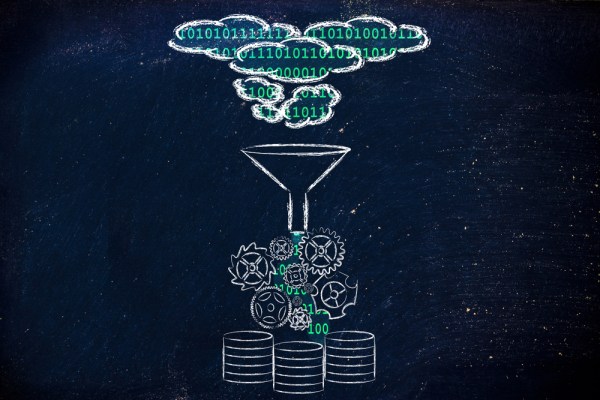Editor’s note: Deven Parekh is a managing director at Insight Venture Partners where he manages investments in e-commerce, consumer Internet data, and application software businesses on a global basis.
The great Danish physicist Niels Bohr once observed that “prediction is very difficult, especially if it’s about the future.” Particularly in the ever-changing world of technology, today’s bold prediction is liable to prove tomorrow’s historical artifact. But thinking ahead about wide-ranging technology and market trends is a useful exercise for those of us engaged in the business of partnering with entrepreneurs and executives that are building the next great company.
Moreover, let’s face it: gazing into the crystal ball is a time-honored, end-of-year parlor game. And it’s fun.
So in the spirit of the season, I have identified five big data themes to watch in 2015. As a marketing term or industry description, big data is so omnipresent these days that it doesn’t mean much. But it is pretty clear that we are at a tipping point. The global scale of the Internet, the ubiquity of mobile devices, the ever-declining costs of cloud computing and storage, and an increasingly networked physical word create an explosion of data unlike anything we’ve seen before.
The creation of all of this data isn’t as interesting as the possible uses of it. I think 2015 may well be the year we start to see the true potential (and real risks) of how big data can transform our economy and our lives.
Big Data Terrorism
The recent Sony hacking case is notable because it appears to potentially be the first state-sponsored act of cyber-terrorism where a company has been successfully threatened under the glare of the national media. I’ll leave it to the pundits to argue whether Sony’s decision to postpone releasing an inane farce was prudent or cowardly. What’s interesting is that the cyber terrorists caused real fear to Sony by publicly releasing internal enterprise data — including salaries, email conversations and information about actual movies.
Every Fortune 2000 management team is now thinking: Is my data safe? What could happen if my company’s data is made public and how could my data be used against me? And of course, security software companies are investing in big data analytics to help companies better protect against future attacks.
Big Data Becomes a Civil Liberties Issue
Data-driven decision tools are not only the domain of businesses but are now helping Americans make better decisions about the school, doctor or employer that is best for them. Similarly, companies are using data-driven software to find and hire the best employees or choose which customers to focus on.
But what happens when algorithms encroach on people’s privacy, their lifestyle choices and their health, and get used to make decisions based on their race, gender or age — even inadvertently? Our schools, companies and public institutions all have rules about privacy, fairness and anti-discrimination, with government enforcement as the backstop. Will privacy and consumer protection keep up with the fast-moving world of big data’s reach, especially as people become more aware of the potential encroachment on their privacy and civil liberties?
Open Government Data
Expect the government to continue to make government data more “liquid” and useful – and for companies to put the data to creative use. The public sector is an important source of data that private companies use in their products and services.
Take Climate Corporation, for instance. Open access to weather data powers the company’s insurance products and Internet software, which helps farmers manage risk and optimize their fields. Or take Zillow as another example. The successful real estate media site uses federal and local government data, including satellite photography, tax assessment data and economic statistics to provide potential buyers a more dynamic and informed view of the housing market.
Personalized Medicine
Even as we engage in a vibrant discussion about the need for personal privacy, “big data” pushes the boundaries of what is possible in health care. Whether we label it “precision medicine” or “personalized medicine,” these two aligned trends — the digitization of the health care system and the introduction of wearable devices — are quietly revolutionizing health and wellness.
In the not-too-distant future, doctors will be able to create customized drugs and treatments tailored for your genome, your activity level, and your actual health. After all, how the average patient reacts to a particular treatment regime generically isn’t that relevant; I want the single best course of treatment (and outcome) for me.
Health IT is already a booming space for investment, but clinical decisions are still mostly based on guidelines, not on hard data. Big data analytics has the potential to disrupt the way we practice health care and change the way we think about our wellness.
Digital Learning, Everywhere
With over $1.2 trillion spent annually on public K-12 and higher education, and with student performance failing to meet the expectations of policy makers, educators and employers are still debating how to fix American education. Some reformers hope to apply market-based models, with an emphasis on testing, accountability and performance; others hope to elevate the teaching profession and trigger a renewed investment in schools and resources.
Both sides recognize that digital learning, inside and outside the classroom, is an unavoidable trend. From Massive Open Online Courses (MOOCs) to adaptive learning technologies that personalize the delivery of instructional material to the individual student, educational technology thrives on data. From names that you grew up with (McGraw Hill, Houghton Mifflin, Pearson) to some you didn’t (Cengage, Amplify), companies are making bold investments in digital products that do more than just push content online; they’re touting products that fundamentally change how and when students learn and how instructors evaluate individual student progress and aid their development. Expect more from this sector in 2015.
Now that we’ve moved past mere adoption to implementation and utilization, 2015 will undoubtedly be big data’s break-out year.
